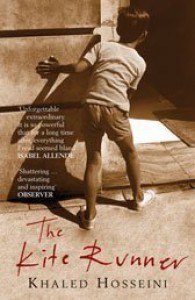4
Followers
8
Following
Breadcrumb Reads
This is the companion blog to my main book blog, Breadcrumb Reads. My reading tastes veer towards the classics, literary fiction, creative non-fiction and historical fiction.
 My husband had seen the film adaptation of The Kite Runner (by Khaled Hosseini) and told me that it was incredibly boring. Luckily for me I was in the middle of the book when he said so, or the chances of my having read this book would have been a bare minimum. As it was, I enjoyed the book. I could see, though, how the movie could have been slow-moving and boring - there is not much action that converts into a solid plot. The plot is mostly in the heart and mind of the narrator. It lies in his memories that are riddled with longing, jealousy and guilt.
My husband had seen the film adaptation of The Kite Runner (by Khaled Hosseini) and told me that it was incredibly boring. Luckily for me I was in the middle of the book when he said so, or the chances of my having read this book would have been a bare minimum. As it was, I enjoyed the book. I could see, though, how the movie could have been slow-moving and boring - there is not much action that converts into a solid plot. The plot is mostly in the heart and mind of the narrator. It lies in his memories that are riddled with longing, jealousy and guilt.The basic outline of the story is this: two Afghani boys grow up together in the same house. They are unlike each other in most ways - they belong to two different races; they belong to two different stations in life (one rich, the other a servant boy); though of the same faith one is a Sunni Muslim and the other a Shi'a; the one uses his literacy to tease the other, while the other is as loyal to him as a pup to its master; the one is a coward, the other is brave.
This story, then becomes, a tale of courage, suffering, cowardice, and at the end, redemption. It is told with such simplicity and yet so powerfully. It works so well as a memory, highlighting only those incidents and tiny details that lend support to the main plot of the re-telling. I could easily see myself sitting beside the narrator as he told me this entire story.
There were little turns of phrases that made me relish the reading experience as well. I didn't mark any of them, but there is this one that I knew where to find:
In Afghanistan, yelda is the first night of the month of Jadi, the first night of winter, and the longest night of the year. ...After I met Soraya Taheri, every night of the week became a yelda for me. (p. 125)
It was also interesting to see what Afghanistan was like before it was invaded by the Russians and then taken over by the Taliban. The picture described when Amir returns to his home country in 2001 is heartbreakingly reminiscent of what we see on TV; but we know through the telling, that Afghanistan looked nothing like what it is today, some forty years ago!
What fascinated me the most, disgusted me and kept me reading, was the character of Amir himself. I would like to say, at the very start, that I wanted to like Amir, to empathise with him, and feel sorry for him. But while this was probable in the first two or three chapters, I only grew to dislike him as the story moved on. He wasn't particularly an admirable character in any way (not that he was supposed to be), but I saw no redeeming quality in him. Even the guilt that he carries with him after betraying his best friend does not become in the least bit constructive.
All of Amir's actions, in his initial years, seem to be driven by the need to please his father. With this, I could sympathise, especially as he thought his father blamed him for his mother's death (she had died at childbirth). Rahim Khan, Amir's father's best friend, is the one who sees Amir's longing and tries to help him. But there is another who understands Amir's need - Hassan - and he is ever willing to try and help him.
Hassan and I fed from the same breasts. We took our first steps on the same lawn in the same yard. And, under the same roof, we spoke our first words.
Mine was Baba.
His was Amir. My name.
Looking back on it now, I think the foundation for what happened in the winter of 1975 - and all that followed - was already laid in those first words.
This quote highlights the basic outline of all that happens in the novel. Amir, an object of pity with regard to his situation, becomes an object of contempt - this last, especially during his adult hood, when he seeks to bury his past and the baggage that comes with it, in a new life in America. I could, at no point, see him as a man of honour. Even when he woos his girl, I felt a sense of remoteness, detachment. I wasn't rooting for him. But here and there an incident would take place when I would think, there is some goodness in him - goodness or it is mere hypocrisy. At the end, I could only bring myself to like Amir when, at the very last page, we see him working so hard, earnestly, and lovingly for his redemption - no hypocrisy there!
<<This review is an extract from two post made on my blog: http://breadcrumbreads.blogspot.com>>


